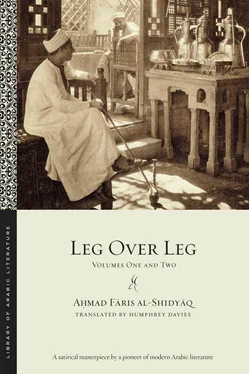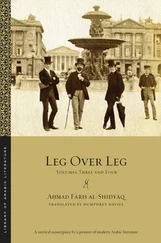667Bion: Bion of Borysthenes (ca. 325–250), who is said to have attached himself to all the contemporary schools of philosophy in succession and to have attacked everyone and everything.
Abīshalūm Absalom.
Abū Nuwās (al-Ḥasan ibn Hāniʾ al-Ḥakamī) a poet (ca. 140–98/755–813) of the Abbasid period.
al-Andalus those parts of the Iberian Peninsula that were under Islamic rule from the seventh to the fifteenth centuries AD.
Bag-men (khurjiyyūn) the author’s term for Protestant missionaries in the Middle East, whether the American Congregationalists of the Board of Commissioners of Foreign Missions, with whom he first came into contact in Beirut, or the British Anglicans of the Church Missionary Society, for whom he worked later in Malta, Egypt, and London. The Congregationalists established their first mission station in Beirut in 1823 (Makdisi, Artillery , 81, 83). In December 1823, when their intention to proselytize became clear, Maronite patriarch Yūsuf Ḥubaysh (1787–1845), who had initially received them cordially, ordered his flock to avoid all contact with what he referred to as “the Liberati” or “Biblemen” (Makdisi, Artillery , 95–97).
Bilqīs Queen of Sabaʾ (Sheba) in Yemen, the story of whose visit to Sulaymān (Solomon) is told in the Qurʾān (Q Naml 27:22–44).
cubit (dhirāʿ) 0.68 m.
Dāʾūd David.
Days of Barbarism (The) (al-Jāhiliyyah) the period in Arabia before the coming of Islam.
Druze a monotheistic religious community found primarily in Syria and Lebanon.
emir (amīr) a title (lit., “commander” or “prince”) assumed by local leaders in the Arab world; as used in Book One, the term refers most often to the emirs of the Shihābī dynasty of Mount Lebanon.
Fāriyāq (The) the hero of the events described in the book and the author’s alter ego, the name itself being a contraction of Fāri(s al-Shid) yāq.
Himyar (Ḥimyar) a kingdom of ancient Yemen that flourished between the first and fourth centuries AD.
Iblīs the Devil, Satan.
Ilyās Elias.
Khawājā a title of reference and address afforded Christians of substance.
kuttāb a one-room school in which children are taught reading, writing, and numeracy.
maqāmah, plural maqāmāt “short independent prose narrations written in ornamented rhymed prose ( sajʿ ) with verse insertions which share a common plot-scheme and two constant protagonists: the narrator and the hero” (Meisami and Starkey, Encyclopedia , 2:507). The thirteenth chapter of each book of the present work is described by the author as a maqāmah , the plot-scheme in these maqāmāt being a debate. See further Zakharia, “Aḥmad Fāris al-Šidyāq.”
Market Boss (The) (shaykh al-sūq) the author’s term for the Maronite patriarch.
Market-men (sūqiyyūn) the author’s term for the Maronite and Roman Catholic clergy, or the Maronite and Roman Catholic churches in general.
market trader (ḍawṭār, plural ḍawāṭirah) the author’s term for a member of the Maronite upper clergy.
Maronite of or pertaining to the Maronite Christian community, whose historical roots lie in northern Syria and Lebanon and whose church, while using Syriac as a liturgical language, is in communion with the Roman Catholic church.
mawwāl a form of vernacular poetry, often involving complex rhyme schemes and word play.
Mountain (The) Mount Lebanon, a mountain range in Lebanon extending for 170 kilometers parallel to the Mediterranean coast and the historical homeland of both the Maronite and Druze Lebanese communities.
Muʿtazilite follower of a school of theology that appealed to reason as a basis for understanding the truths of Islam.
Nākir and Nakīr angels who question the deceased in the grave concerning his or her faith.
Nūḥ Noah.
Numrūdh Nimrod.
People of the Cave (ahl al-kahf) believing youths who, as recounted in the eighteenth surah (chapter) of the Qurʾan (Q 18, Sūrat al-Kahf), were caused by God to fall asleep in a cave for many years and then revived and who had no knowledge of how many years they had passed there.
Qāmūs (al-) Al-Qāmūs al-muḥīṭ ( The Encompassing Ocean ), a dictionary compiled by Muḥammad ibn Yaʿqūb al-Fīrūzābādī (d. 817/1415) that became so influential that qāmūs (“ocean”) eventually came to mean simply “dictionary.” The author later published a study of the Qāmūs entitled Al-Jāsūs ʿalā l-Qāmūs ( The Spy on the Qāmūs ).
Qāyin Cain.
Recoiler (The) (al-Khannās) Satan, so called because he recoils at the mention of the name of God.
rhymed prose (sajʿ) “artistic prose, subject to certain constraints of rhyme and rhythm… Etymologically, the word referred to the cooing of pigeons” (Meisami and Starkey, Encyclopedia , 2:677). First used by pre-Islamic soothsayers, the form developed, often in combination with other types of parallelism, until it became virtually de rigueur by the tenth century AD, and it remained in use into the early twentieth century, “by which time, however, the modern revolt which has now largely swept away this sort of artifice was already growing strong” (idem). The author uses saj‛ in the title of the work and most of his chapter titles, in short scattered bursts in the midst of unrhymed prose (especially at moments of drama), and sometimes, as in the four preceding chapters, in sustained blocks. For further discussion of sajʿ in this work, see Jubran, “Function.”
Sām Seth son of Noah.
Sībawayhi Abū Bishr ʿAmr ibn ʿUthmān ibn Qanbar Sībawayhi (or Sībawayh) (second/eighth century), the creator of systematic Arabic grammar. By the fourth/tenth century, his only work, Kitāb Sībawayhi, was firmly established as the foundation of a grammatical system that has remained essentially unchanged to the present (Meisami and Starkey, Encyclopedia , 2:718).
Sulaymān Solomon.
Surra Man Raʾā Samarra, a city in Iraq, capital of the Abbasid caliphate from 836 to 892; the name may be interpreted as “A Joy to All Who See It”.
Suyūṭī (al-), Jalāl al-Dīn a prolific polymath (d. 911/1505), much of whose 500-work oeuvre compiles material taken from earlier scholars.
Waqāʾiʿ al-miṣriyyah (al-) the Egyptian official gazette (and the first newspaper issued, partially, in Arabic), established in December 1828.
Yashuʿ (al-) Elisha.
Yūnus Jonah.
Yūsuf Joseph.
Zabbāʾ (al-) Zenobia, queen of Tadmur in Syria during the third century AD.
The index that appeared in the print version of this title was intentionally removed from the eBook. Please use the search function on your eReading device for terms of interest. For your reference, the terms that appear in the print index are listed below
abbots
ʿAbd al-Jalīl
ʿAbd al-Laṭīf al-Baghdādī
ʿAbd al-Qādir
Abīshalūm (Absalom)
Abū ʿAtāhiyah
Abū l-Baqā
Abū Nuwās
Abū Rushd ‘Brains’ ibn Ḥazm (character in Leg over Leg)
Abū Tammām
Abū l-Aswad al-Duʾalī
Abū l-ʿIbar
affections
Agag
Aḥmad Bāy
Aḥmad, Shaykh
al-Akhḍarī
Al-Bagdadi, Nadia
Alexandria, [Aḥmad] Fāris al-Shidyāq in
Читать дальше












